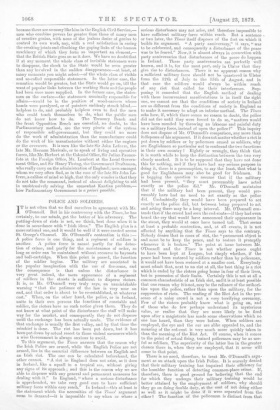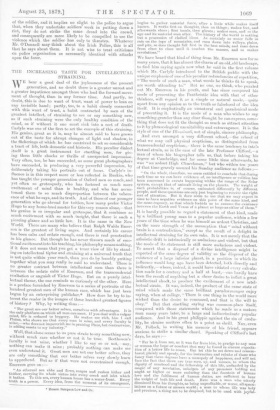POLICE AND SOLDIERS.
IT is not often that we find ourselves in agreement with Mr. O'Donnell. But in his controversy with the Times, he has certainly, to our minds, got the better of his adversary. The putting-down of riots is not, we think, best done when it is done in accordance with " Irish ideas." The English plan is a more rational one, and it would be well if it were carried across St. George's Channel. Mr. O'Donnell's contention is this :- A police force is one thing, and a regiment of soldiers is another. A police force is meant partly for the detec- tion of crime, and partly for the maintenance of order, so long as order can be maintained without recourse to bayonets and ball-cartridge. When this point is passed, the function
of the soldier begins. The military are associated in the popular imagination with the use of fire-arms, and the consequence is that unless the disturbance is very groat indeed, the mere appearance of a regiment of soldiers in the streets is sufficient to disperse rioters. It is, as Mr. O'Donnell very truly says, an unmistakable warning "that the patience of the law is very near an end, and that order is about to be re-established, at whatever cost." When, on the other hand, the police, as in Ireland, unite in their own persons the functions of constable and soldier, the rioters have no such notice given them. They do not know at what point of the disturbance the staff will make way for the musket, and consequently they do not disperse until the exchange has been actually made. The evidence of that exchange is usually the first volley, and by that time the mischief is done. The riot has been put down, but it has been put down by actual resort to those violent measures which a wise Government is always anxious to avoid.
To this argument, the Times answers that the reason why the Irish Police are armed, while the English Police are not armed, lies in the essential difference between an English and an Irish riot. The one can be calculated beforehand, the other cannot. " A riot in England does not arise, as it does in Ireland, like a squall in a tropical sea, without giving any signs of its approach ; and this is the reason why we are able to dispense with any general and permanent measures for dealing with it." In England, " where a serious disturbance is apprehended, we take very good care to have sufficient military force within easy reach." In Ireland—this at least is the statement which the necessities of the Times' argument seem to demand—it is impossible to say when or where a serious disturbance may not arise, and therefore impossible to have sufficient military force within reach. But a sentence or two later, the Times itself disposes of the fact on which it builds its argument. " A party anniversary," it says, " was to be celebrated, and consequently a disturbance of the peace was to be feared." Now, it is almost always in connection with party anniversaries that disturbances of the peace do happen in Ireland. These party anniversaries are perfectly well known, and it is, for the most part, only in Ulster that they give rise to disturbances. There is no apparent reason why a sufficient military force should not be quartered in Ulster from the 12th of July to the 15th of August, and in that case the soldiers would always be within reach of any riot that called for their interference. Sup- posing it conceded that the English method of dealing with these inconvenient manifestations is in itself the right one, we cannot see that the conditions of society in Ireland are so different from the conditions of society in England as to make it necessary to adopt an inferior method. The Times asks how, if, which there seems no reason to doubt, the police did not fire until they were forced to do so, "matters would have been mended by throwing an irksome and painful duty on a military force, instead of upon the police ?" This inquiry does not dispose of Mr. O'Donnell's comparison, any more than it disposes of his argument. If it does not matter whether a riot is put down by soldiers or by policemen armed as soldiers, why are Englishmen so particular not to confound the two functions in their own country I Rightly or wrongly, they think that it is worth while to keep the distinction between the two very clearly marked. It is to be supposed that they have not done this for nothing, and if they have had any serious purpose in doing it, there is a presumption, to say the least, that what is good for Englishmen may also be good for Irishmen. It is begging the question to assume that if the military had been present, " they must presumably have acted exactly as the police did." Mr. O'Donnell maintains that if the military had been present, they would pre- sumably have had no need to act exactly as the police did. Undoubtedly they would have been prepared to act exactly as the police did, but between being prepared to act and aoting there may be a long interval. Mr. O'Donnell con- tends that if the crowd had seen the red-coats—if they had even heard the cry that would have announced their appearance in the street, they would at once have turned tail. That seems at least a probable contention, and, at all events, it is not affected by anything that the Times says to the contrary. Nobody denies that in eases of riot, the "paramount object is and must be to keep the peace, and to restore it promptly whenever it is broken." The point at issue between Mr. O'Donnell and the Times is not whether peace ought to have been kept at Lurgan, but simply whether, if the peace had been restored by soldiers rather than by policemen, it would not have been restored at a smaller cost. Everybody must admit that, next to no riot at all, the best thing is a riot which is ended by the rioters going home in fear of their lives, but in possession of their limbs. Certainly this is not at all a common characteristic of an Irish riot, and it is at least possible that one reason why it isnot, may be the reliance of the authori- ties upon the police, rather than upon the military, for the suppression of riots. The reading of the Riot Act in the pre- sence of a noisy crowd is not a very terrifying ceremony. Few of the rioters probably know what is going on, and of those who do few perhaps understand its mysterious value, or realise that they are more likely to be fired upon after a magistrate has made some observations which no one has heard, than they were before. When soldiers are employed, the eye and the ear are alike appealed to, and the meaning of the red-coat is very much more quickly taken in than the meaning of the Riot Act. Of course, when it comes to the point of actual firing, trained policemen may be as use- ful as soldiers. The superiority of the latter lies in the greater chance there is, when they are employed, that it never will come to that point.
There is no need, therefore, to treat Mr. O'Donnell's argu- ment as an attack upon the Irish Police. It is scarcely denied that their military training has impaired their efficiency for the humbler function of detecting common-place crime. If, therefore, there is good ground for believing that the end for which they undergo their military training would be better attained by the employment of soldiers, why should they go on doing double duty, at the cost of not doing either as well as it might be done if it were separated from the other V The function of the policeman is distinct from that of the soldier, and it implies no slight to the police to argue that, when they undertake soldiers' work in putting down a riot, they do not strike the same dread into the crowd, and consequently are more likely to be compelled to use the violence which the soldier. has only to threaten. Whatever Mr. O'Donnell may think about the Irish Police, this is all that he says about them. It is not wise to treat criticisms on police organisation as necessarily identical with attacks upon the force.































 Previous page
Previous page